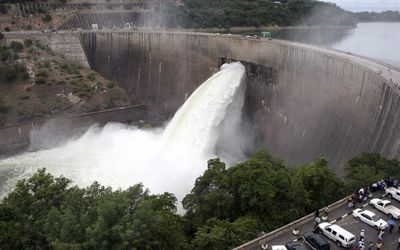
Zimbabwe’s mining industry faces a bleak future as the country’s main electricity supply plant, Kariba Hydro, has capped its output at 475 megawatts, down from a recent winter peak of 705MW due to lower dam water levels.
BY MTHANDAZO NYONI
The mining sector requires significantly higher power supplies than other sectors and is the single largest contributor to gross domestic product (GDP).
Presenting a Chamber of Mines of Zimbabwe report at the Bulawayo District Mining Association’s third quarter meeting on Thursday, Davy Matyanga, who is the chamber’s minerals economist, said the scaling down of power generation at Kariba would affect operations in the mining sector.
“The situation at Kariba is a cause for concern for us in the mining industry. According to Zimbabwe Power Company, water levels at Kariba have dropped significantly and that means a lot to us. As a player in the mining sector, you have to think [about] what will happen to your businesses,” Matyanga said.
In a statement last week, the Zimbabwe Power Company (ZPC) said the water level at Kariba was 1% below the previous year’s level of 485,91 metres above sea level following lower water inflows into the dam during the 2014/15 hydrological year.
It said it had been determined that continuing at current levels of power generation would result in the lake falling below the minimum drawdown level of 475,5 metres before the onset of the next rainy season. Matyanga said the future looked bleak in the mining industry because of power shortages compounded by dropping mineral prices.
“All minerals, except gold, recorded a decrease in the first half of the year. The situation in the sector is not looking too good. Value production declined 12,9% and we hope measures put [in place] by the government will go a long way in supporting the industry. We seem to be in a fix with the issue of power,” he said.
- Chamisa under fire over US$120K donation
- Mavhunga puts DeMbare into Chibuku quarterfinals
- Pension funds bet on Cabora Bassa oilfields
- Councils defy govt fire tender directive
Keep Reading
He added that chances of getting supplementary power from other countries were very slim as the whole region was battling to plug energy deficits.
Zimbabwe currently generates just over 1 300MW against a demand of about 2 000MW.
A recent report by the Chamber of Mines of Zimbabwe revealed that mines were already battling with the reliability of electricity supply. It said power outages caused by faults and load-shedding had resulted in loss of production time by as much as 10%.
The report also revealed that unstable power supplies were causing companies to incur heavy losses as some processes were interrupted, thereby affecting the quality of products.
Mines and Mining Development minister, Walter Chidakwa recently said mining companies should come together and build a power station to cushion themselves from electricity shortages in the country.
The Kariba power plant is the biggest contributor to Zimbabwe’s power grid with an average 55%. The plant is undergoing a Chinese-funded $500 million expansion, which is expected to add 300MW by the first quarter of 2018.










